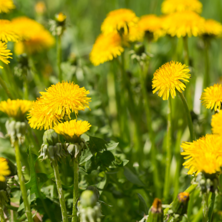April roundup - Weed heroes, solar power, and fun in the classroom
Solar panels helping households with growing energy costs
 The number of households installing rooftop solar panels reached its highest level in more than seven years in the first months of 2023. As the cost of energy bills sky-rocketed, residents are turning to renewable energy to guard against spiralling costs.
The number of households installing rooftop solar panels reached its highest level in more than seven years in the first months of 2023. As the cost of energy bills sky-rocketed, residents are turning to renewable energy to guard against spiralling costs.
Figures show that more than 50,700 households installed solar arrays between January and March, more than double the number in the same months last year and the highest figure since late 2015.
In Nottingham, the City Council has installed solar arrays on around 55 commercial buildings and 3,500 social homes.
This increase in solar installations comes at a time when new analysis by climate thinktank Ember shows that the power sector is entering a ‘new era of falling fossil fuel generation’. Use of coal, gas, and oil are being replaced by a record expansion of wind and solar power. According to the report, the overall share of low-carbon electricity is now almost 40% of total generation.
Exploring fun ways to teach young people about the climate crisis
Research from the University of Surrey suggests that teaching young people about the climate crisis in an interactive and exploratory way could reverse the declining interest in Science, Technology, Engineering, and Maths (STEM) courses.
The researchers developed the Heat-Cool project which aims to encourage curiosity about climate and air pollution issues and inspire the next generation of climate leaders. Pupils used infra-red cameras to learn about urban heat islands – an occurrence where cities experience higher temperatures due trapped heat as there are fewer green spaces. Through the programme, climate change literacy increased among 79% of primary school students and 62% of secondary school students.
Weed heroes and desert gardens to feature at flower shows

Despite having a bad reputation for taking over gardens, these plants are often are great sources of nectar for pollinating insects like bees.
A third of gardens at the Chelsea Flower Show will include weeds in a move to rebrand them as resilient plants. Four of the show’s gardens will feature plants such as brambles, thistles and knapweed.
The Hampton Court Flower Show is also being influenced by the climate crisis. This year, the show will feature gardens that use creative methods to mitigate against heatwaves. ‘Desert gardens’ featuring cacti and succulents that are drought-tolerant will be used, reducing the need to water them.
Opportunities to reduce UK’s higher than average consumption
A new study has shown that here in the UK our consumption is 20% higher than the global average. Furthermore, of the materials we consume only 7.5% will then go on to be re-used.
However, the good news is there is opportunity for the UK to significantly reduce its consumption. This study demonstrates that the UK could reduce its carbon footprint by as much as 43% if we minimise the number of materials we consume by participating in re-use and recycle schemes.
Nottingham Fixers is a brilliant initiative where volunteers are helping the public to repair items that would have been binned. At their April event, they fixed 23 devices and prevented 68kg of rubbish!
Citizens empowered to hold countries to account on climate inaction
 A landmark resolution passed by the United Nations will make it it easier for citizens to hold their countries accountable for climate change inaction. This historic move, agreed by more than 120 countries including the UK, means that states could be taken to court if they fail take steps to protect their citizens from emerging climate risks.
A landmark resolution passed by the United Nations will make it it easier for citizens to hold their countries accountable for climate change inaction. This historic move, agreed by more than 120 countries including the UK, means that states could be taken to court if they fail take steps to protect their citizens from emerging climate risks.
Keep up to date with the latest news about Nottingham's progress to becoming a carbon neutral city by signing up for our monthly newsletter.
